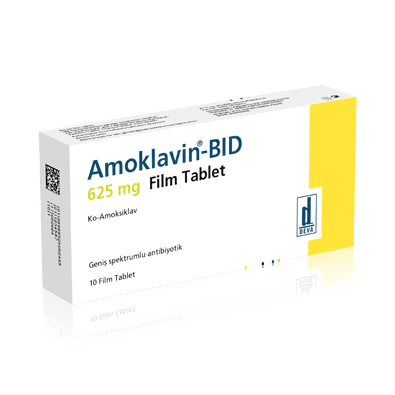Amoxiclav is indicated for use in the following infections in adults and children. The drug is used according to a doctor's prescription, but what else should patients pay attention to for more effective and safer treatment?
1. What is Amoxiclav?
Amoxiclav is a product of Lek Pharmaceuticals d.d. Amoxiclav 1000mg contains the following main ingredients: 875mg Amoxicillin in the form of Amoxicillin trihydrate and 125mg of the active ingredient Clavulanic Acid in the form of potassium Clavulanate (ratio 7:1).
2. What is the use of Amoxiclav?
Amoxiclav 1000mg is indicated for the treatment of the following infections in adults and children:
- Treatment of acute bacterial sinusitis (when the condition has been diagnosed);
Acute otitis media; - Amoxiclav treats acute exacerbations of chronic bronchitis (used when the condition has been diagnosed);
- Treatment of community-acquired pneumonia;
- Cystitis;
- Treatment of pyelonephritis;
- Skin and soft tissue infections, especially cellulitis, animal bites, severe dental abscesses with diffuse cellulitis;
- Treatment of bone and joint infections, especially osteomyelitis.
It is best to review the official instructions for Amoxiclav regarding the drug's therapeutic indications before using Amoxiclav.
3. Dosage and how to use Amoxiclav
3.1. Always use Amoxiclav 1000mg exactly as prescribed by your doctor
Amoxiclav dosage for adults and children weighing 40kg or more:
- Common Amoxiclav dosage: 1 tablet, 2 times/day;
- Higher Amoxiclav dosage: 1 tablet, 3 times/day;
Amoxiclav dosage for children weighing <40 kg:
For children 6 years of age and younger, it is best to treat infections with Amoxicillin/Clavulanic Acid in the form of an oral suspension or powder packet;
Be careful and follow the advice of your doctor or pharmacist when using Amoxiclav 1000mg tablets for children weighing less than 40 kg.
Amoxiclav dosage for patients with kidney and liver problems:
For patients with kidney problems, the dosage of Amoxiclav may be changed: The doctor may choose a different dose or a different medicine to treat the disease;
If the patient has liver problems, more frequent blood tests are needed to check the liver function during Amoxiclav treatment.
3.2. How to use Amoxiclav
Take Amoxiclav tablets at the beginning of meals or close to meals;
Use Amoxiclav doses evenly spaced throughout the day, at least 4 hours apart and do not take 2 doses within 1 hour.
Do not use Amoxiclav for more than 2 weeks but still feel unwell, the patient should see a doctor for a check-up.
4. Contraindications of Amoxiclav
Do not use Amoxiclav in the following cases:
Patients who are allergic (hypersensitive) to Amoxicillin, clavulanic acid, Penicillin or any other ingredient of Amoxiclav 1000mg;
Patients with a history of severe allergic reactions (hypersensitive) to any other antibiotics, symptoms include skin rash or swelling of the face or neck;
Patients who have had liver problems or jaundice when taking any antibiotic;
5. Side effects of Amoxiclav
Commonly reported side effects of Amoxiclav are diarrhea, nausea and vomiting. Other side effects of Amoxiclav:
- Infections/parasites:
Common side effects: Candida infection of mucous membranes;
Unknown side effects: Overgrowth of non-susceptible bacteria when taking Amoxiclav.
- Blood and lymphatic system disorders:
Rare side effects include reversible leukopenia (including neutropenia), thrombocytopenia due to Amoxiclav;
Unknown side effects: Reversible agranulocytosis in patients taking Amoxiclav, hemolytic anemia, prolongation of bleeding time and prothrombin time.
- Immune system disorders
Unknown side effects: Angioedema, anaphylactic shock with Amoxiclav, serum sickness-like syndrome, hypersensitivity vasculitis.
- Nervous system disorders
Uncommon side effects: Dizziness, headache;
Unknown side effects: Reversible hyperactivity, convulsions, aseptic meningitis.
- Gastrointestinal disorders
Very common side effects: Amoxiclav-induced diarrhea;
Common side effects of Amoxiclav: Nausea, vomiting;
Uncommon side effects: Dyspepsia;
Unknown side effects: Amoxiclav-induced colitis, black tongue.
- Hepatobiliary disorders
Uncommon side effects: Increased AST or ALT;
Unknown side effects: Hepatitis, cholestatic jaundice.
- Skin and subcutaneous tissue disorders
Uncommon side effects: Rash, pruritus, urticaria.
Rare side effects: Erythema multiforme.
Unknown side effects: Stevens-Johnson syndrome, toxic epidermal necrolysis, bullous exfoliative dermatitis, acute generalized exanthematous pustulosis (AGEP).
- Renal and urinary disorders
Unknown side effects: Interstitial nephritis,;
Inform your doctor of any side effects you experience while taking Amoxiclav.
6. Precautions when using Amoxicillin
During the use of Amoxicillin, patients should pay attention to the following issues:
- Before treatment with Amoxicillin, patients should be carefully checked for hypersensitivity reactions to Penicillin, Cephalosporin and other beta-lactam antibiotics;
- Convulsions may occur in patients with renal failure or in patients taking high doses of Amoxicillin;
- Avoid using Amoxicillin if infectious mononucleosis is suspected due to the appearance of a measles-like rash after using Amoxicillin;
- Concomitant use of Allopurinol during treatment with Amoxicillin may increase the risk of allergic skin reactions;
- Prolonged use of Amoxicillin may cause overgrowth of non-susceptible bacteria;
- The appearance of a generalized erythematous rash with pustules at the start of treatment with Amoxiclav may be a symptom of generalized exanthematous pustulosis (AGEP). Amoxiclav treatment should be discontinued immediately and re-administration of Amoxicillin is contraindicated;
- Amoxiclav should be used with caution in patients with evidence of impaired liver function;
- Antibiotic-associated colitis has been reported with nearly all classes of antibiotics. Therefore, the diagnosis should be considered in patients who develop diarrhoea during or after antibiotic treatment. If antibiotic-associated colitis develops, Amoxiclav should be discontinued immediately, and antimotility drugs are contraindicated in this situation;
- Periodic assessment of renal, hepatic and hematopoietic function is recommended during long-term Amoxiclav therapy;
- In patients with renal impairment, the dose of Amoxiclav should be adjusted appropriately based on the severity of renal impairment;
- During high-dose Amoxicillin therapy, patients should maintain adequate fluid intake and urinary output to minimize the risk of crystalluria;
- The presence of clavulanic acid in Amoxicillin may cause false-positive results in the Coombs test;
- Prophylactic treatment with Amoxicillin/Clavulanic acid may be associated with an increased risk of necrotizing enterocolitis in neonates, so Amoxicillin/Clavulanic acid should be avoided during pregnancy unless the physician considers the benefit to be essential;
- Both active ingredients in Amoxicillin are excreted in breast milk, causing diarrhea and fungal infections in the mucous membranes of breastfed infants, which may require discontinuation of breastfeeding. However, Amoxicillin/Clavulanic acid can still be used during breastfeeding after the risk/benefit has been considered by the physician.
7. Drug interactions of Amoxiclav
Drug interactions of Amoxiclav may occur as follows:
- Interaction of Amoxiclav with oral anticoagulants: increased international normalized ratio INR in patients who maintain the use of Acenocoumarol or Warfarin with Amoxicillin. If used concurrently, bleeding time or INR index should be carefully monitored;
- Methotrexate: Penicillin antibiotics can reduce the excretion of Methotrexate, increasing the risk of toxicity.
- Probenecid: Concomitant use of Amoxiclav with Probenecid is not recommended because Probenecid reduces the excretion of Amoxicillin in the renal tubules, increasing and prolonging the concentration of Amoxicillin in the blood, but does not affect the concentration of clavulanic acid.
- Amoxiclav 1000mg contains the main ingredient Amoxicillin in the form of Amoxicillin trihydrate and 125mg of the active ingredient Clavulanic Acid in the form of potassium Clavulanate. Amoxiclav 1000mg is indicated for the treatment of bacterial infections.
To arrange an appointment, please call HOTLINE or make your reservation directly HERE. You may also download the MyVinmec app to schedule appointments faster and manage your reservations more conveniently.













